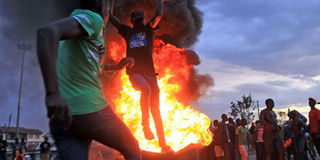Good politics is the solution to protests hurting economy

Nasa supporters demonstrate in Kondele, Kisumu County, after Mr Uhuru Kenyatta was announced victor of the presidential election on October 30, 2017. Slums and informal settlements have grown into a potent factor in the politics of street demonstrations. PHOTO | TONNY OMONDI | NATION MEDIA GROUP
What you need to know:
- More than ever before, many Kenyans are having to put up with low-paying, low quality jobs.
- We have done very well in terms of jerking up infrastructure spending.
So, what lessons and trends have we learned and observed from the just-concluded electioneering period?
Indeed, many fundamental changes are happening quietly in this society under our very noses, but whose impact on society remains hidden to us until they reveal themselves in a bang, especially during periods of intense conflict and political competition.
Personally, I am worried about the extent our capital city — Nairobi — is becoming increasingly fragile and vulnerable to street protests and demonstrations.
ECONOMY
We are at a point where any mere mention of a planned protest rally or street demonstration inevitably sends the capital into a state of panic and paralysis.
Kepsa, the private sector lobby, has estimated that the economy lost a whopping Sh700 billion during the period of political instability, reflecting the damage by political demonstrations to business and the economy, in general.
We always knew that the phenomenal growth of informal sector settlements was a growing time bomb in terms of security of the city.
But recent events point to a worsening situation in terms of the ability of slum settlements such as Kawangware, Kibra, and Mathare to push us to the political cliff edge.
BUSINESSES
Indeed, recent confrontations between the police and the marauding youths in Kawangware and Kibra have demonstrated just how ill-equipped the police are when it comes to insulating the business community from the effects of political riots and demonstrations.
But what I found even more scary was the stubbornness which the youthful protesters exhibited as they staged run-ins and street battles with riot police.
I made a mental note that we are lucky that these slum dwellers still fight the police with stones and slings.
In ethnically divided Kenya, informal settlements in the capital city take a tribal pattern, with the result that each slum will be dominated by one of the major groups.
The upshot is a situation where each of the slums is aligned with one of the major political parties involved in the fight for power at the national level.
PROTESTERS
Thus, slums and informal settlements have grown into a potent factor in the politics of street demonstrations.
It is why any street demonstrations and protests called in Nairobi by the elite of the major parties inevitably attract large crowds.
How do we, in the long run, protect business in Nairobi from the effects of bad politics and frequent street demonstrations? Good politics. Period.
If we are to bring political temperatures down, exorcise the grievances over the presidential elections, and provide space for healing, there will have to emerge — from both sides of the political divide — leaders who avoid inflammatory speeches, can restrain their ethnic followers and are willing to make compromises with their adversaries.
And, just how long will it take the economy to bounce back from the impact of the electioneering period? We can only wait to see.
JOBS
Ours is a chronically weak economy that has often succeeded in posting high growth, but struggles to meet most of the demands of the ordinary citizen.
Our economy’s biggest weakness is its inability to provide decent jobs for citizens.
More than ever before, many Kenyans are having to put up with low-paying, low quality jobs.
There are several other trends I find worrisome. We have done very well in terms of jerking up infrastructure spending.
But is has come with a massive jump in debt service obligations.
REVENUE
Our wage bill is worrying, and one waits to see the time when government spending will shift in a major way from consumption towards wealth creation.
The number of profit warning issues by listed companies is up and tax collections by the Kenya Revenue Authority are all on a downward trend.
Yet another sign of bad times in the economy is a drop in take-up of credit by the private sector.
The numbers from published audited accounts of commercial banks show that too many of our small banks are in distress, facing crippling liquidity problems and tottering towards insolvency.
BUDGET
Worse, the government itself is in the middle of a public expenditure crisis evident in the adjustments and reallocations it made in the recent supplementary budget.
In the coming months, the government will itself have no option other than to seek some fast-disbursing support from institutions such as the World Bank’s IDA, to enable it to swap expensive syndicated foreign and domestic debt for concessional debt.
This country needs political stability like never before.





